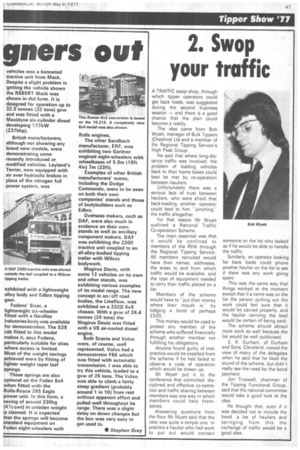2. Swop your traffic
Page 77

If you've noticed an error in this article please click here to report it so we can fix it.
A TRAFFIC swop shop, through which tipper operators could get back loads, was suggested during the second business session — and there is a good chance that the plan could become a reality.
The idea came from Bob Wyatt, manager of Bulk Tippers (Cheshire) Ltd and a member of the Regional Tipping Service's. High Peak Group: He said that where long-distance traffic was involved, the problem of loading vehicles back to their home bases could best be met by co-operation between hauliers.
Unfortunately there was a serious lack of trust between hauliers, who were afraid that back-loading another operator could lead to him "pinching" the traffic altogether.
For that reason Mr Wyatt outlined a National Traffic Co-operation Scheme.
The main essential was that it would be confined to members of the RHA through the Regional Tipping Service. All members recruited would have their names, addresses, the areas to and from which traffic would be available, and the type of equipment needed to carry their traffic placed on a list.
Members of the scheme would have to "put their money where their mouth is" by lodging a bond of perhaps £500.
This money would be used to protect any member of the scheme who suffered financially through another member not fulfilling his obligations.
Anyone found guilty of malpractice would be expelled from the scheme if he had failed to observe a code of operation which would be drawn up.
Mr Wyatt put it to the conference that controlled, disciplined and effective co-operation and traffic sharing between members was one way in which members could help themselves.
Answering questions from the floor Mr Wyatt said that the idea was quite a simple one. In practice a haulier who had work to put out would contact someone on the list who looked as if he would be able to handle the traffic.
Similarly, an operator looking for back loads could phone another haulier on the list to see if there was any work going spare.
This was the same way that things worked at the moment except that if a name was on the list the person putting out the work could feel sure that it would be carried properly, and the haulier carrying the load would be certain of being paid.
The scheme should attract more work as well because the list would be well publicised.
E. R. Durham, of Durham and Sons, Cleveland, voiced the view of many of the delegates when he said that he liked the sound of the scheme, but didn't really see the need for the bond payment.
Jim Truswell, chairman of the Tipping Functional Group, said that the national committee would take a good look at the idea.
He thought that, even if it was decided not to include the bond, a list of hauliers and springing from this the exchange of traffic would be a good idea.
























































































































